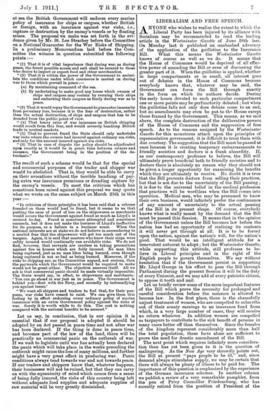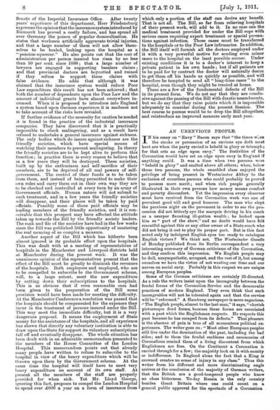LIBERALISM AND FREE SPEECH.
ANYONE who wishes to realize the extent to which the Liberal Party has been injured by its alliance with Socialism may be recommended to read the leading article in the Westminster Gazette of June 26th last. On Monday last it published an unabashed advocacy of the application of the guillotine to the Insurance Bill. What this means the Westminster Gazette knows of course as well as we do. It means that the House of Commons would be deprived of all effec- tive power of amending the Bill or even of discussing the greater part of it. When the guillotine is applied, whether in large compartments or in small, all interest goes out of debates in the House of Commons because everybody knows that, whatever may be said, the Government can force the Bill through exactly in the form on which its authors decide. During the early hours devoted to each particular compartment one or more points may be perfunctorily debated ; but when the guillotine falls not only does debate come to an end, but no amendments may even be put to the House except those framed by the Government. This means, as we said above, the complete destruction of the deliberative powers of the House of Commons and the suppression of free speech. As to the reasons assigned by the Westminster Gazette for this monstrous .attack upon the principles of representative government, it is difficult to treat them with due courtesy. The suggestion that the Bill must be passed at once because it is creating temporary embarrassments to friendly societies and doctors is a frank absurdity. If, as our contemporary professes to believe, the Bill will ultimately prove beneficial both to friendly societies and to doctors there is absolutely no reason why they should not be given a longer opportunity for examining the benefits which they are ultimately to receive. No doubt it is true that the Bill prevents doctors from selling their practices, but that is not due to the uncertainty of the Bill passing ; it is due to the universal belief in the medical profession that practices will be worthless when the Bill comes into operation. Medical men, who may be presumed to know their own business, would infinitely prefer the continuance of any amount of uncertainty to the actual passing of the Bill in its present shape. Of course, everybody knows what is really meant by the demand that the Bill must be passed this Session. It means that in the opinion of the Government unless the Bill becomes law before the nation has had an opportunity of realizing its contents it will never get through at all. It is to be forced upon the nation, against the nation's will, for the nation's good. That would be an intelligent attitude for a benevolent autocrat to adopt ; but the Westminster Gazette, while supporting this attitude, still professes to be- lieve in Liberal principles and in the right of the English people to govern themselves. We say without hesitation that if the Government persist in supporting Mr. Lloyd George in his effort to pass the Bill through Parliament during the present Session it will be the duty of every Unionist, and we may add of every patriotic citizen, to oppose it tooth and nail.
Let us briefly review some of the more important features of the Bill which prove the necessity for prolonged and careful consideration before the measure is allowed to become law. In the first place, there is the shamefully unjust treatment of women, who are compelled to subscribe out of their scanty earnings to an insurance fund from which, in a very large number of cases, they will receive no return whatever. In addition women are compelled as taxpayers to contribute to the sick benefit of persons in many cases better off than themselves. Since the females of the kingdom represent considerably more than half the total population, these facts alone are sufficient to prove the need for drastic amendment of the Bill. The next point which requires infinitely more considera- tion than has yet been given to it is the question of malingering. As the New Age very shrewdly points out, the Bill at present " pays people to be ill," and, since demand always stimulates supply, we may be certain that there will always be plenty of illness to be paid for. The importance of this question is emphasized by the experience of the German insurance schemes. In another column we publish a review of a very remarkable pamphlet, from the pen of Privy Councillor Friedensburg, who has recently retired from the position of President of the Senate of the Imperial Insurance Office. After twenty years' experience of this department, Herr Friedensburg expresses the opinionthat the insurance systemintroduced by Bismarck has proved a costly failure, and has spread all over Germany the poison of popular demoralization. He states that workmen artificially aggravate trivial injuries, and that a large number of them will not allow them- selves to be healed, looking upon the hospital as a "pension-squeezer." He also points out that the cost of administration per person insured has risen by no less than 50 per cent. since 1888 ; that a large number of lawyers are engaged in supporting baseless claims • and that provincial doctors are boycotted and ruined if they refuse to support these claims with false evidence. He adds that although it was claimed that the insurance system would reduce Poor Law expenditure this result has not been achieved ; that both the number of dependents upon the Poor Law and the amount of individual grants have almost everywhere in- creased. When it is proposed to introduce into England a system based upon German experience it is madness not to take account of the risks here revealed.
If further evidence of the necessity for caution be needed it is found in the practice of the industrial insurance companies. They have discovered - that it is practically impossible to check malingering, and as a result have refused to undertake a general insurance against sickness. The only bodies which do insure against sickness are the friendly societies, which have special means of watching their members to prevent malingering. In theory the friendly societies are to be kept alive to perform this function ; in practice there is every reason to believe that in a few years they will be destroyed. These societies, built up by the enthusiasm and self-sacrifice of their members, are to be deprived of all real powers of self- government. The control of their funds is to be taken from them, and instead of being permitted to make their own rules and carry them out in their own way they are to be checked and controlled at every turn by an army of Government officials. Human nature will not submit to such treatment, and in a few years the friendly societies will disappear, and their places will be taken by paid officials. Possibly some of these paid officials may be leading members of the friendly societies, and it is con- ceivable that this prospect may have affected the attitude taken up towards the Bill by the friendly society leaders. The rank and file of the societies have had in the few weeks since the Bill was published little opportunity of mastering the real meaning of so complex a measure.
Another aspect of the Bill which has hitherto been almost ignored is its probable effect upon the hospitals. This was dealt with at a meeting of representatives of hospitals in the Manchester and Liverpool districts held at Manchester during the present week. It was the unanimous opinion of the representatives present that the effect of the Bill must be greatly to diminish the revenues of the hospitals. Both employers and employed, who are to be compelled to subscribe to the Government scheme, will, to a large extent, meet the new expenditure by cutting down their subscriptions to the hospitals. This is so obvious that if even reasonable care had been given to the preparation of the Bill some provision would have been made for meeting the difficulty. At the Manchester Conference a resolution was passed that the hospitals should be compensated for the expenses they incur in the treatment of persons insured under the Bill. This may meet the immediate difficulty, but it is a very dangerous proposal. It means the employment of State money for the assistance of the hospitals, and all experience has shown that directly any voluntary institution is able to draw upon the State for support its voluntary subscriptions fall off and eventually disappear. The whole situation has been dealt with in an admirable memorandum presented to the members of the House Committee of the London Hospital. This memorandum points out that already many people have written to refuse to subscribe to the hospital in view of the heavy expenditure which will be thrown upon them by the Government scheme. At the same time the hospital will itself have to meet very heavy expenditure on account of its own staff. At present all the members of the staff are properly provided for when sick. Yet Mr. Lloyd George, ignoring this fact, proposes to compel the London Hospital to spend over £800 a year on a form of insurance from which only a portion of the staff can derive any benefit. That is not all. The Bill, so far from relieving hospitals of their present work, will add to it. In no case can the medical treatment provided for under the Bill cope with serious cases requiring expert treatment or special precau- tions against infection. These cases must be transferred to the hospitals or to the Poor Law infirmaries. In addition, the Bill itself will furnish all the doctors employed under it with a very powerful motive for sending even minor cases to the hospital on the least possible excuse. Under existing conditions it is to a doctor's interest to keep a private patient in his own hands ; but if all patients are to be paid for by contract the doctor will naturally desire to get them off his hands as quickly as possible, and will therefore be tempted to send all " long-time cases " to the hospital, even though they might be treated at home. These are a few of the fundamental defects of the Bill in its present form. We do not say that they are conclu- sive against the passing of the Bill with drastic amendments, but we do say that they raise points which it is impossible adequately to consider during the present Session. The best course to pursue would be to drop the Bill altogether, and reintroduce an improved measure early next year.















































 Previous page
Previous page